The origins of all 30 NHL team names
The stories behind Detroit's winged wheel, Boston's brown and yellow, and more
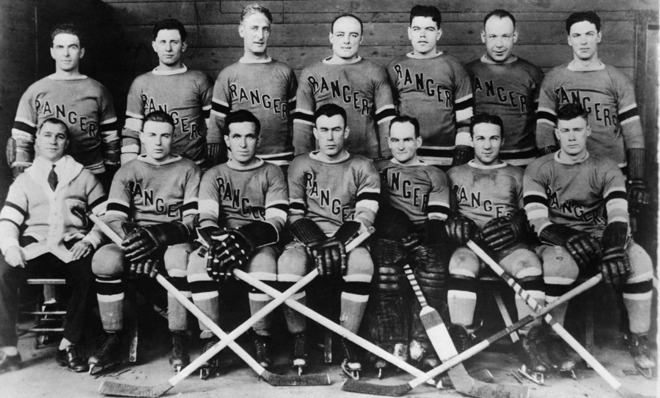
A free daily email with the biggest news stories of the day – and the best features from TheWeek.com
You are now subscribed
Your newsletter sign-up was successful

Ever wonder what a Canuck is? How about a Blue Jacket? Here's a breakdown of how the league's 30 teams got their names.
1. New York Rangers
In 1925, the New York Americans joined the National Hockey League and played their home games at the old Madison Square Garden. Tex Rickard, the boxing promoter and ex-gold prospector who built and owned the arena, decided he wanted his own NHL team, which he was awarded in 1926. Rickard's team was immediately dubbed "Tex's Rangers" as a pun referencing the paramilitary force founded in Texas during the 1830s. The Americans folded in 1942, while Tex's Rangers remain.
The Week
Escape your echo chamber. Get the facts behind the news, plus analysis from multiple perspectives.

Sign up for The Week's Free Newsletters
From our morning news briefing to a weekly Good News Newsletter, get the best of The Week delivered directly to your inbox.
From our morning news briefing to a weekly Good News Newsletter, get the best of The Week delivered directly to your inbox.
2. New Jersey Devils
Given that New Jersey has never been known for its mountains, the team needed a new nickname after the Colorado Rockies relocated to the Garden State in 1982. The New Jersey Sports and Exhibition Authority sponsored a statewide newspaper contest to determine the new nickname and some of the other finalists included Americans, Blades, Coastals, Colonials, Gulls, Jaguars, Meadowlanders, and Meadowlarks. While some fans objected to the winning selection on religious grounds — one threatened the life of a reporter who was covering the search — the Devil has an entirely non-religious folk history in New Jersey. According to legend, a harmless creature known as the Leeds Devil, or the Jersey Devil, roamed the Pine Barrens in the southern part of the state from 1887 until 1938.
3. New York Islanders
When New York's expansion Major League Baseball franchise held a name-the-team contest in 1961, Islanders finished third behind Mets and Empires. Eleven years later, Islanders was selected as the nickname for New York's new hockey team, which plays its home games on Long Island.
A free daily email with the biggest news stories of the day – and the best features from TheWeek.com
4. Philadelphia Flyers
The team sponsored a name-the-team contest after Ed Snider, then-vice president of the Philadelphia Eagles, brought hockey back to the City of Brotherly Love in 1966. Snider's sister, Phyllis, reportedly suggested the name Flyers, which sounds good when paired with Philadelphia but doesn't have any real meaning.
5. Pittsburgh Penguins
The Pittsburgh Post-Gazette sponsored a name-the-team contest, but Carol McGregor, the wife of one of the franchise's part owners, Jack McGregor, was the one responsible for the nickname. In his book, Pittsburgh Penguins: The Official History of the First 30 Years, Bob Grove describes how Carol McGregor came up with the name. "I was thinking of something with a P. And I said to Jack, 'What do they call the Civic Arena?' And he said, 'The Big Igloo.' So I thought, ice...Pittsburgh...Penguins." More than 700 of the 26,000 contest entries were for Penguins.
6. Boston Bruins
When grocery store tycoon Charles Adams brought a team to Boston, he hired former hockey great Art Ross to serve as his general manager. Adams tasked Ross with coming up with a nickname, with one of the requirements being that the team's colors would be the same as his grocery store chain's: brown and yellow. Ross decided on Bruins.
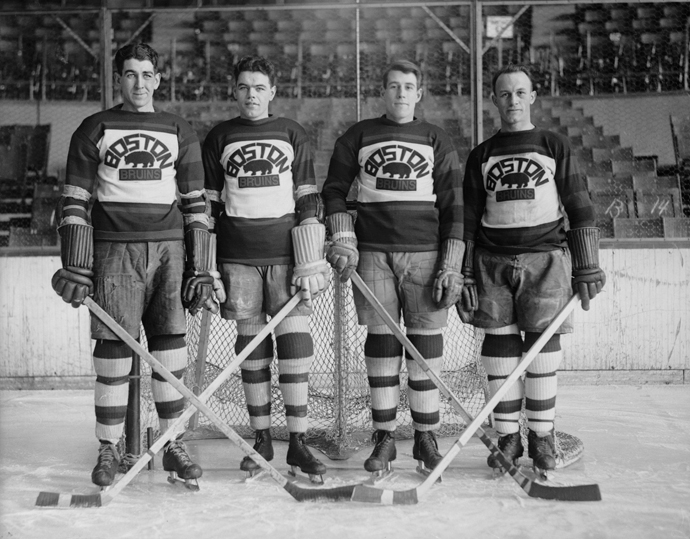
7. Buffalo Sabres
When Buffalo entered the league in 1970, owners Seymour Knox III and Northrup Knox wanted the nickname for their new team to be unique. The brothers sponsored a name-the-team contest and decided on Sabres, with a buffalo featured prominently in the team's logo.
8. Montreal Canadiens
In 1909, John Ambrose O'Brien created the Club de Hockey Canadien. Ambrose wanted his team, a charter member of the National Hockey Association, to appeal to Montreal's francophone population and he hoped to drum up a rivalry with the city's established team, the Wanderers. The Canadiens are often referred to as "The Habs" or "Les Habs," an abbreviation of "Les Habitants," the name for the early settlers of New France.
(More from Mental Floss: 55 awesome Halloween costume ideas)
9. Ottawa Senators
The original Ottawa Senators, founded in 1883, won 11 Stanley Cups. When an NHL team returned to Ottawa in 1992 after a nearly 60-year hiatus, the nickname, a reference to Ottawa's status as Canada's capital city, was an obvious choice.
10. Toronto Maple Leafs
Conn Smythe purchased Toronto's hockey team in 1927 and one of his first orders of business was renaming the team. The franchise that began play as the Arenas in 1917 changed its nickname to St. Patricks in 1919 to attract Toronto's Irish population. Smythe eventually decided on Maple Leafs, for a couple possible reasons. Smythe fought in the Maple Leaf Regiment during World War I, and there was a former Toronto hockey team called the East Maple Leaves.
11. Winnipeg Jets
The Winnipeg Jets, formed in late 1971, got their moniker from a team of the same name that played in Canada's Western Hockey League. The current franchise is actually the second incarnation; the first relocated to Phoenix, Arizona, in 1996 and became the Phoenix Coyotes. The current franchise was originally called the Atlanta Thrashers — named by Ted Turner after Georgia's state bird, the brown thrasher — before it was sold to a Canadian group, True North Sports & Entertainment, in 2011, and relocated.
12. Carolina Hurricanes
After the Hartford Whalers moved to Raleigh in 1997, new owner Peter Karmanos Jr. named his team after the devastating storms that regularly ravage the region.
13. Florida Panthers
Had Tampa Bay been awarded a baseball team in the early '90s, they likely would've been called the Florida Panthers, a reference to the endangered species of the same name. Instead, the nickname was adopted by Florida's second NHL team. When Panthers President Bill Torrey revealed the nickname, he told reporters, "A panther, for your information, is the quickest striking of all cats. Hopefully, that's how we will be on the ice."
14. Tampa Bay Lightning
In 1990, a thunderstorm served as inspiration for then-president of the Tampa Bay Hockey Group Phil Esposito's decision to name his team the Lightning. Esposito said that, in addition to being a natural characteristic of the Tampa Bay area, Lightning expressed the fast action of a hockey game.
15. Washington Capitals
Washington owner Abe Pollin decided on the perfectly apt nickname Capitals after staging a name-the-team contest.
16. Chicago Blackhawks
World War I veteran and coffee tycoon Frederic McLaughlin was the team's owner when it entered the NHL in 1926. McLaughlin named the team after the 86th Infantry Division in which he served. The "Black Hawk Division" was named after Chief Black Hawk of the Sauk American Indian tribe, who fought the Illinois militia in 1832. The nickname was officially changed from Black Hawks to Blackhawks in 1986.
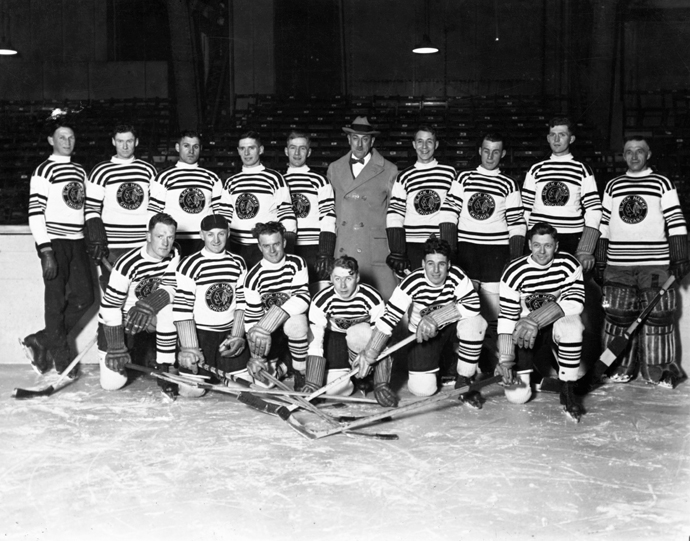
17. Columbus Blue Jackets
Blue Jackets was the winning entry in a name-the-team contest. According to the team's website, the name "celebrates patriotism, pride, and the rich Civil War history in the state of Ohio and, more specifically, the city of Columbus." Ohio contributed more residents to the Union Army than any other state during the Civil War.
(More from Mental Floss: What happens to your body during a breakup?)
18. Detroit Red Wings
After purchasing the Detroit Falcons in 1932, James Norris renamed the team after the "Winged Wheelers," the nickname of the Montreal Hockey Club for which he once played. Norris chose a winged wheel as the team's logo, a nod to Detroit's growing reputation as the heart of the automobile industry.
19. Nashville Predators
A vote by the fans helped determine Nashville's nickname, a reference to the saber-toothed tiger remains that were discovered during an excavation in the city in 1971.
20. St. Louis Blues
According to the team's website, owner Sid Saloman Jr. selected the nickname Blues in 1967 after W.C. Handy's song, "St. Louis Blues." Mercury and Apollo were two of the other nicknames that were considered.
21. Calgary Flames
The Flames played in Atlanta from 1972 until 1980 and their nickname was a reference to the burning of Atlanta by General William T. Sherman during the Civil War. While the team moved, the nickname remained.
22. Colorado Avalanche
Rockies, the nickname for Colorado's hockey team that left for New Jersey in 1982, had been adopted by Denver's baseball team by the time the Quebec Nordiques left Canada for the Front Range in 1995. Management originally wanted to name the team Extreme, but received all sorts of negative feedback, and justifiably so. Avalanche, which eventually beat out Black Bears, Outlaws, Storm, Wranglers, Renegades, Rapids, and Cougars, drew some criticism, as well, given their deadly nature. A member of the marketing group responsible for naming the team replied: "This is the NHL, a rough and tough sport, and Avalanche is something that matches the 'on the edge' feel they want to create. Hey, Cougars and Bears kill people, too. People shouldn't get so excited about Avalanche being a disrespectful name or something. It's just a name."
23. Edmonton Oilers
Edmonton, the capital of Alberta, is also the oil capital of Canada. Edmonton began play in 1972 in the World Hockey Association and retained the name Oilers when it joined the NHL in 1979.
24. Minnesota Wild
In 1998, Wild was chosen from a field of six finalists, which also included the Blue Ox, Northern Lights, Voyageurs, White Bears, and Freeze. (Voyageurs were the working-class employees of fur trading companies in the region during the 1700s.)
25. Vancouver Canucks
Johnny Canuck, who originally appeared as a Canadian political cartoon character in 1869, was reinvented as a comic book action hero who fought Adolf Hitler, among other villains, during World War II. Canuck is also slang for Canadian, making Vancouver's hockey team the Canadian equivalent of the New York Yankees — with a little less money.
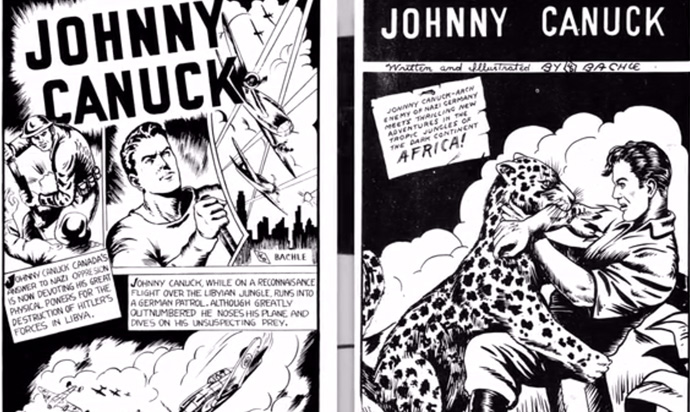
26. Dallas Stars
When the Minnesota North Stars, whose nickname was decided by a fan contest, moved to Texas in 1993, they ditched the "North" and didn't feel compelled to replace it with "South" or "Lone."
27. Los Angeles Kings
The late Jack Kent Cooke, who owned the Los Angeles Lakers and later the Washington Redskins, settled on Kings as the team nickname from entries submitted in a fan contest. The Los Angeles Monarchs played in the Pacific Coast Hockey League during the 1930s and Cooke's new team adopted the same royal color scheme as the Lakers.
(More from Mental Floss: 15 fantastic and filthy Shakespearean insults)
28. Anaheim Ducks
Quack. Quack. Quack! Quack! QUACK! Anaheim joined the NHL in 1993 and its team was known as the Mighty Ducks, after the wildly popular Disney movie and cross-marketing vehicle of the same name. The nickname was changed to Ducks and the logo was changed in 2005 after Disney sold the team.
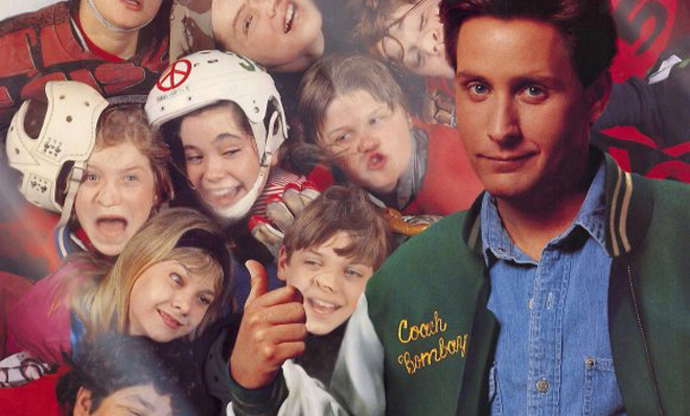
29. Arizona Coyotes
The Winnipeg Jets moved to Phoenix in 1996 and Coyotes was the winner in a name-the-team contest that attracted more than 10,000 entries. Scorpions was the runner-up.
30. San Jose Sharks
Sharks was chosen from 2,300 entries in San Jose's name-the-team contest. The other finalists included Rubber Puckies, Screaming Squids, Salty Dogs, and Blades. Blades was the most popular entry, but ultimately rejected because of its gang implications. When the nickname was chosen, seven shark species made their home in a stretch of the Pacific Ocean off the California coast called The Red Triangle.
-
 Political cartoons for February 15
Political cartoons for February 15Cartoons Sunday's political cartoons include political ventriloquism, Europe in the middle, and more
-
 The broken water companies failing England and Wales
The broken water companies failing England and WalesExplainer With rising bills, deteriorating river health and a lack of investment, regulators face an uphill battle to stabilise the industry
-
 A thrilling foodie city in northern Japan
A thrilling foodie city in northern JapanThe Week Recommends The food scene here is ‘unspoilt’ and ‘fun’